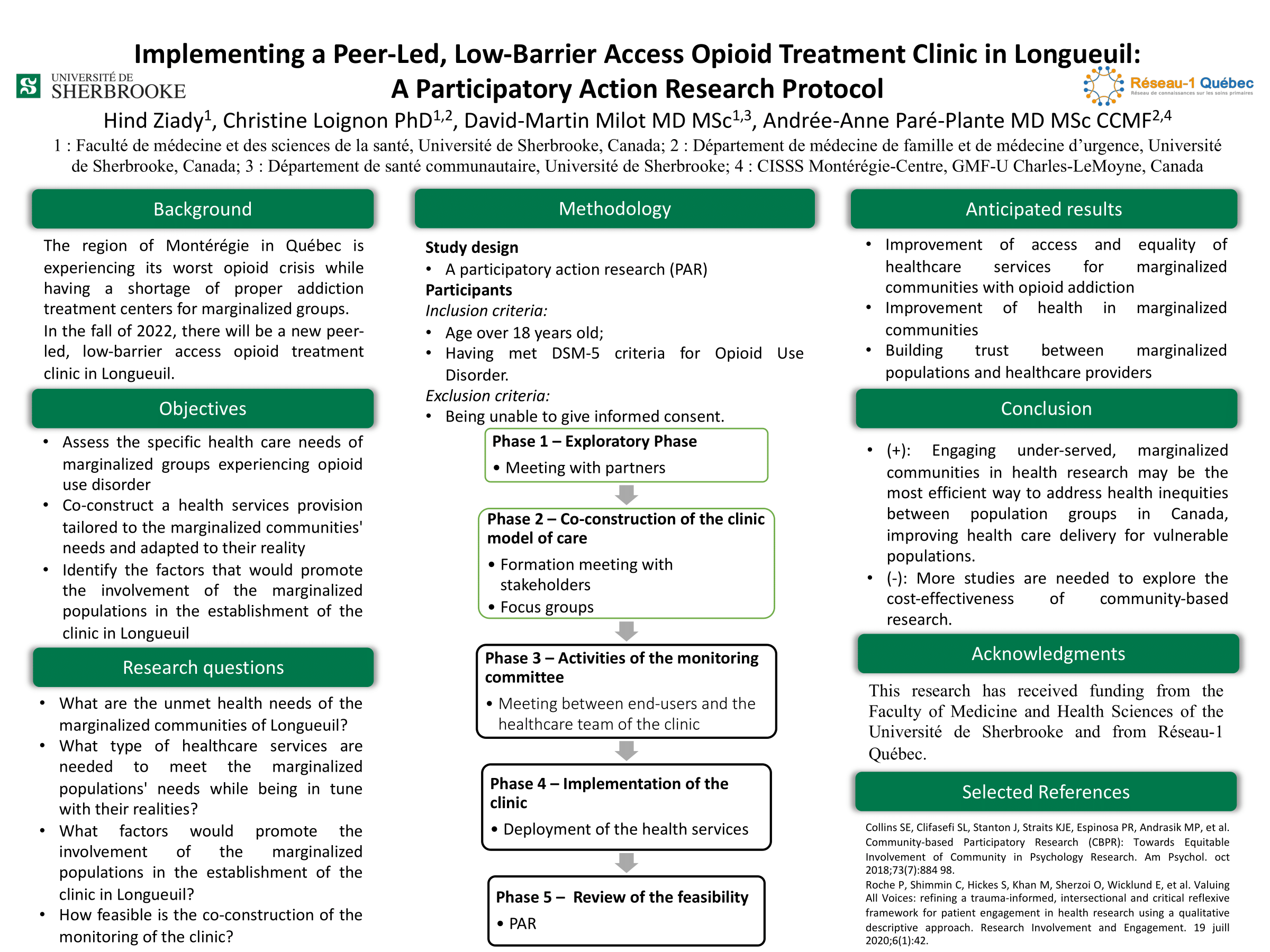SRFP061: Implementing a Peer-Led, Low-Barrier Opioid Treatment Clinic in Longueuil: A Participatory Action Research
Andree-Anne Pare-Plante, MD, MSc, CCFP (AM); Hind Ziady
Abstract
Context: The ongoing outbreak of COVID-19 exacerbated the opioid epidemic in Canada, revealing inequities in the country’s healthcare system. The region of Montérégie in Québec is currently experiencing its worst opioid crisis while having a shortage of proper addiction treatment centers for marginalized groups – as is the case for those experiencing homelessness along with substance use disorder in Longueuil. This lack of opioid resources is clear proof of inequalities in access to primary care among marginalized groups in the region.
Objective: To assess the specific health care needs of marginalized groups experiencing opioid use disorder with the goal of implementing a peer-led, low-barrier opioid rehabilitation clinic to help better serve their needs in Longueuil, Québec.
Study Design: A participatory action research (PAR) in two phases: 1- A citizen panel; 2- A case study using a qualitative method.
Setting: First phase of the study will take place will take place in the facilities of local community organizations that specialize in providing care for marginalized groups. The Montérégie Department of public health and the local community organizations will assist with the recruitment of difficult-to-reach individuals with opioid addiction.
Population Studied: Members of marginalized communities with opioid addiction (n ≃ 30-50). Inclusion criteria include age over 18 years old and the satisfaction of DSM-5 criteria for opioid use disorder for at least one year. Exclusion criteria include the inability to give informed consent.
Intervention: A clinic in addiction treatment for opioid use disorder with a low treshold of access to care for marginalized patients.
Main Outcome Measures: Patients-reported experiences and feedback about the care of marginalized populations with opioid use disorder.
Anticipated Results: Improvement of access and quality of healthcare services for marginalized communities with opioid addiction. Building trust between marginalized populations and healthcare providers. Improvement of health in marginalized communities.
Conclusions: Engaging under-served, marginalized communities in health research may be the most efficient way to address health inequities between population groups in Canada, improving health care delivery for vulnerable populations. However, more studies are needed to explore the cost-effectiveness of community-based research.
Objective: To assess the specific health care needs of marginalized groups experiencing opioid use disorder with the goal of implementing a peer-led, low-barrier opioid rehabilitation clinic to help better serve their needs in Longueuil, Québec.
Study Design: A participatory action research (PAR) in two phases: 1- A citizen panel; 2- A case study using a qualitative method.
Setting: First phase of the study will take place will take place in the facilities of local community organizations that specialize in providing care for marginalized groups. The Montérégie Department of public health and the local community organizations will assist with the recruitment of difficult-to-reach individuals with opioid addiction.
Population Studied: Members of marginalized communities with opioid addiction (n ≃ 30-50). Inclusion criteria include age over 18 years old and the satisfaction of DSM-5 criteria for opioid use disorder for at least one year. Exclusion criteria include the inability to give informed consent.
Intervention: A clinic in addiction treatment for opioid use disorder with a low treshold of access to care for marginalized patients.
Main Outcome Measures: Patients-reported experiences and feedback about the care of marginalized populations with opioid use disorder.
Anticipated Results: Improvement of access and quality of healthcare services for marginalized communities with opioid addiction. Building trust between marginalized populations and healthcare providers. Improvement of health in marginalized communities.
Conclusions: Engaging under-served, marginalized communities in health research may be the most efficient way to address health inequities between population groups in Canada, improving health care delivery for vulnerable populations. However, more studies are needed to explore the cost-effectiveness of community-based research.

Jack Westfall
jwestfall@aafp.org 11/21/2021Terrific project. Great poster and abstract. Thanks for sharing at NAPCRG